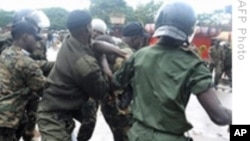The European Union has imposed an arms embargo on the West African country of Guinea. The decision was made in response to the killing of anti-government protesters last month by Guinea's security forces.
The European Union has banned the transfer of arms from the European Union to Guinea and also says it will restrict travel and freeze the assets of members of junta leader Captain Moussa Dadis Camara's government. Captain Camara seized power in a military coup last December.
A statement from EU ministers said they had decided to punish Guinea's rulers because, in their words, of the "gross violations of human rights, including many deaths, injuries and rapes" that took place last month.
According to the United Nations, security forces in Guinea opened fire on protesters killing more than 150 people on September 28 in the capital, Conakry. The government says more than 50 people were killed.
Mike Lewis, of the British watchdog Amnesty International, says Europe-based companies supplied some of the military equipment used in last month's attack. He says security forces used anti-riot grenades that had come from France and drove armored vehicles supplied by a South African company owned by a major British defense manufacturer.
"Some of those are European and so the EU embargo does have real intent and is likely to have real bite, but it is true to say that international measures beyond the EU will be necessary to stop arms transfers that are likely to be used in recurrent violations," said Lewis.
Lewis says the Economic Community of West African States, also known as ECOWAS, has lead the way in blocking arms to Guinea.
"ECOWAS already has a number of regional agreements in place which regulates and controls arms transfers into and within the ECOWAS region and so the leadership that they have shown in suspending arms transfers to Guinea from within the region is vital," he said.
Lewis says this arms embargo is crucial, but should have come sooner.
"The events we saw in Guinea last month were not an isolated incident, they were part of a decade of violent repression by Guinea security forces," he said.
The U.N. General Assembly is meeting this week in New York to discuss an Arms Trade Treaty that would regulate the import and export of arms. Lewis says this type of preventative measure is needed.
"States will decide whether to start negotiations for an international arms trade treaty, which will prevent transfers of arms likely to be used in serious violations of human rights well before the kind of major attacks and massacres of the kind we have seen in Guinea," he said.
A resolution on Guinea sponsored by seven nations, including major arms-exporter Britain, has been presented to the U.N. General Assembly. The International Criminal Court has also launched a preliminary investigation into possible crimes against humanity during the violence.
News
EU Arms Embargo Imposed on Guinea
update

<!-- IMAGE -->



